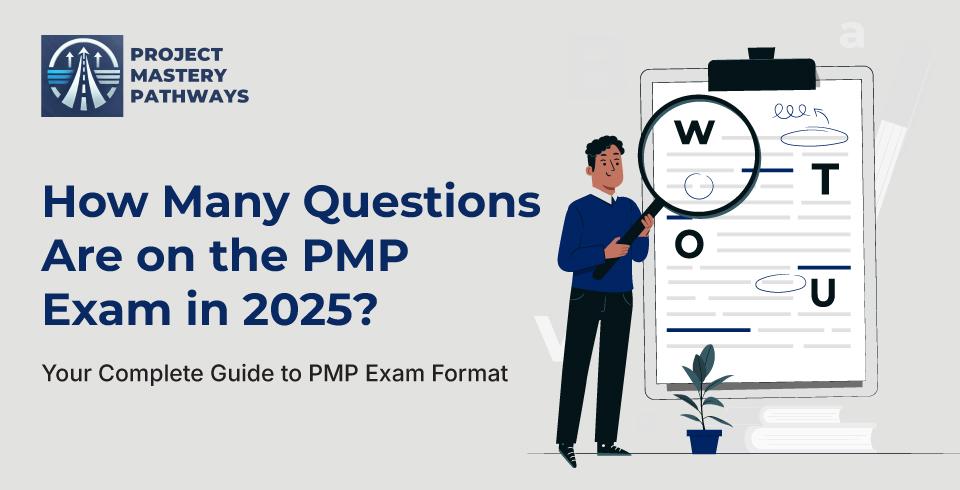Are you preparing for the PMP certification exam in 2025 and wondering exactly how many questions you’ll face on test day? This seemingly simple question often creates confusion among aspiring project managers, especially with PMI’s recent changes to the exam format. Understanding the exact number of questions, their types, and how they’re structured is crucial for developing an effective study strategy and managing your time during the actual exam. By the end of this comprehensive guide, you’ll have complete clarity on the PMP exam question format for 2025, enabling you to prepare with confidence and approach your certification journey strategically.
Understanding the Current PMP Exam Structure in 2025
The PMP exam in 2025 contains 180 questions that you must complete within a 230-minute (3 hours and 50 minutes) time window. However, it’s important to understand that not all 180 questions count toward your final score. The exam includes 175 scored questions and 5 pretest questions that are used by PMI to evaluate potential future exam items.
These pretest questions are strategically placed throughout the exam and are indistinguishable from the scored questions. This means you cannot identify which questions are pretest items during your exam, so you must treat every question with equal importance and effort. The pretest questions serve PMI’s purpose of continuously improving and updating their question bank while ensuring the exam remains current with evolving project management practices.
The exam follows a computer-based testing (CBT) format, and you’ll have access to a basic calculator and the ability to mark questions for review. Understanding this structure is fundamental to developing your time management strategy, as you’ll need to allocate approximately 1.3 minutes per question to complete the exam comfortably.
Breaking Down PMP Exam Question Types and Distribution
The 180 questions on the PMP exam are distributed across three main domains that reflect modern project management practices. People domain accounts for 42% of the exam (approximately 76 questions), Process domain represents 50% (approximately 90 questions), and Business Environment domain covers 8% (approximately 14 questions).
Within these domains, you’ll encounter various question types designed to test different levels of understanding. The majority are situational questions that present real-world project scenarios requiring you to apply project management knowledge to solve problems or make decisions. These questions often begin with phrases like “You are a project manager for…” or “Your project team is experiencing…” and require you to choose the best course of action from four possible options.
You’ll also encounter definitional questions that test your understanding of project management terminology and concepts, though these are less common in the current exam format. Additionally, some questions may include exhibits such as charts, graphs, or project documents that you’ll need to analyze before selecting your answer. This variety ensures that the exam tests not just memorization but practical application of project management principles.
Understanding the question distribution helps you prioritize your study efforts. Since the Process domain represents half of all questions, focusing heavily on project management processes, tools, and techniques is essential. However, don’t underestimate the People domain, which emphasizes leadership, team management, and stakeholder engagement skills that are increasingly important in modern project management.
Strategic Time Management for 180 PMP Exam Questions
Managing your time effectively across 180 questions requires a well-planned approach. With 230 minutes available, you have approximately 1.28 minutes per question, but this doesn’t account for breaks or review time. Most successful candidates aim to complete their first pass through all questions in about 3 hours, leaving 50 minutes for review and final adjustments.
Develop a pacing strategy before your exam day. Consider dividing the exam into segments—perhaps reviewing your progress every 45 questions (approximately every hour). This approach helps you stay on track and adjust your pace if needed. If you find yourself spending too much time on difficult questions during your first pass, mark them for review and move forward rather than getting stuck.

Remember that the exam includes two optional 10-minute breaks after questions 60 and 120. These breaks don’t count against your 230-minute time limit, so use them strategically to refresh your mind and maintain focus. Many candidates find that taking these breaks helps them maintain concentration throughout the lengthy exam.
Practice time management during your preparation by taking full-length practice exams under timed conditions. This experience will help you develop an internal clock and become comfortable with the exam’s pacing requirements. Consider exploring comprehensive practice resources like mock simulators that replicate the actual exam experience.
Maximizing Your Success Rate Across All 180 Questions
Success on the PMP exam isn’t just about answering questions correctly—it’s about developing a systematic approach to tackle all 180 questions efficiently. Start by understanding that PMI tests your ability to apply project management knowledge rather than simply recall facts. This means focusing your preparation on understanding concepts deeply rather than memorizing definitions.
Develop a consistent approach to reading and analyzing questions. Read each question carefully, identify the key information, and determine what the question is actually asking before looking at the answer choices. Many candidates make the mistake of rushing through questions and selecting answers that seem correct at first glance but miss the question’s true intent.
For situational questions, which form the majority of the exam, apply the mindset of an experienced project manager. Consider PMI’s philosophy and best practices when evaluating answer choices. Often, the best answer follows PMI’s recommended approach rather than what might work in your specific organizational context.
Building strong foundational knowledge through comprehensive training is crucial for success. Understanding the 6 key principles of Servant Leadership and other modern project management concepts will serve you well across multiple questions. Additionally, familiarizing yourself with the latest PMBOK 7th Edition changes ensure you’re prepared for current exam content.
Remember that achieving success on all 180 questions requires consistent preparation and practice. Consider enrolling in comprehensive training programs that provide the 35 PDU requirement while building the knowledge foundation necessary for exam success.
Conclusion: Your Path to PMP Certification Success
Understanding that the PMP exam contains 180 questions—175 scored and 5 pretest—is just the beginning of your certification journey. Success requires strategic preparation, effective time management, and a deep understanding of project management principles applied across all three domains. With proper preparation and the right resources, you can confidently approach each of the 180 questions and achieve your PMP certification goals.
Ready to start your PMP certification journey? Follow PMPwithRay for comprehensive study tips, exam strategies, and insights from an experienced project management professional. Take your preparation to the next level with detailed project management courses on Udemy designed specifically for aspiring project managers like yourself.

